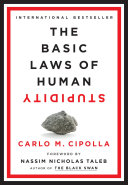
The Basic Laws of Human Stupidity
- اطلاعات
- نقد و بررسی
- دیدگاه کاربران
نقد و بررسی

October 12, 2020
Stupidity is “one of the most powerful dark forces that hinder the growth of human welfare and happiness,” according to this tongue-in-cheek treatise originally published in a 1976 private edition. Cipolla (1922–2000), a professor of economic history at UC Berkeley, argues that, of the four types of human beings (”the helpless, the intelligent, the bandit, and the stupid”), a stupid person is the most dangerous to society because he “causes losses to another person or to a group of persons while himself deriving no gain and even possibly incurring losses.” Though every group has the same percentage of stupid people, their actual numbers are always underestimated, Cipolla posits. Previously, class, caste, and religion guaranteed that stupid people rose to power, but nowadays general elections achieve the same ends by offering stupid voters “a magnificent opportunity to harm everybody else without gaining anything from their action.” In countries on the decline, Cipolla writes, “bandits with overtones of stupidity” proliferate in the corridors of power, while the rest of the population sees an “alarming growth in the number of helpless individuals.” Cipolla never drops his arch, academic tone to reveal his political views, but progressive readers looking for parallels to the Trump era will find plenty in this subtly lacerating account.

January 1, 2021
In a new edition of a self-published 1976 essay, Italian economic historian Cipolla (1922-2000) posits that the most dangerous people are the stupid ones. The author takes a tongue-in-cheek, socio-economic view of human folly in a slim book that divides people into four groups--"the helpless, the intelligent, the bandit, and the stupid"--based on whether they and others gain or lose from their behavior. The helpless gain little from their actions, though others may profit; the intelligent gain from their actions as others also benefit; and the bandits gain as others lose. The stupid gain nothing and may suffer losses as they harm others, and they are therefore the most dangerous. Bandits may have sinister motives, but their actions follow a logic that allows others to predict and defend against them--they act out of a rational self-interest--while the stupid are "erratic and irrational." The author gives all of this material a quasi-scientific air by calling his theories "laws" and by inserting graphs showing quadrants with X and Y axes, including four worksheets in an appendix that let readers fill in friends' propensities for certain traits. These devices should fool no one, however: Cipolla gives no hard data to support his "laws" and no firm definitions of terms such as gains, losses, or irrational. The author instead melds the acidic satirical spirit of his ancient Roman compatriot Juvenal--who railed against stupidity--with the good cheer of a proto-Forrest Gump, whose version of "actions speak louder than words" was, "Stupid is as stupid does." The defect or genius of this book--depending on your view--is that, like a Rorschach test, it lets readers project their views onto what they see on the page. The foreword by Nassim Nicholas Taleb is surprisingly disappointing. Worldviews of Forrest Gump and an ancient Roman satirist converge in a seriocomic analysis of human stupidity.
COPYRIGHT(2021) Kirkus Reviews, ALL RIGHTS RESERVED.




دیدگاه کاربران